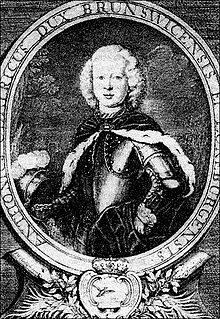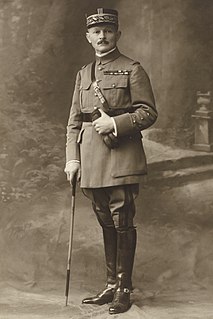 W
WAnthony Ulrich, Duke of Brunswick-Lüneburg, was generalissimus of the Army of Russia, and the husband of Anna Leopoldovna, who reigned as regent of Russia for one year.
 W
WChiang Kai-shek, also known as Chiang Chung-cheng and romanized via Mandarin as Chiang Chieh-shih and Jiang Jieshi, was a Chinese Nationalist politician, revolutionary and military leader who served as the leader of the Republic of China between 1928 and 1975, first in mainland China until 1949 and then in Taiwan until his death.
 W
WFerdinand Foch was a French general and military theorist who served as the Supreme Allied Commander during the First World War. An aggressive, even reckless commander at the First Marne, Flanders, and Artois campaigns of 1914–1916, Foch became the Allied Commander-in-Chief in late March 1918 in the face of the all-out German spring offensive, which pushed the Allies back using fresh soldiers and new tactics that trenches could not contain. He successfully coordinated the French, British and American efforts into a coherent whole, deftly handling his strategic reserves. He stopped the German offensive and launched a war-winning counterattack. In November 1918, Marshal Foch accepted the German cessation of hostilities and was present at the armistice of 11 November 1918.
 W
WFrancisco Franco Bahamonde was a Spanish general who led the Nationalist forces in overthrowing the Second Spanish Republic during the Spanish Civil War and thereafter ruled over Spain from 1939 to 1975 as a dictator, assuming the title Caudillo. This period in Spanish history, from the Nationalist victory to Franco's death, is commonly known as Francoist Spain or the Francoist dictatorship.
 W
WMaurice Gustave Gamelin was a French army general in the French Army. Gamelin is remembered for his disastrous command of the French military during the Battle of France in World War II and his steadfast defence of republican values.
 W
WMáximo Gómez y Báez was a Dominican Major General in Cuba's Ten Years' War (1868–1878) against Spain. He was also Cuba's military commander in that country's War of Independence (1895–1898). He was known for his controversial scorched-earth policy, which entailed dynamiting passenger trains and torching the Spanish loyalists' property and sugar plantations—including many owned by Americans. He greatly increased the efficacy of the attacks by torturing and killing not only Spanish soldiers, but also Spanish sympathizers. By the time the Spanish–American War broke out in April 1898, Gómez had the Spanish forces on the ropes. He refused to join forces with the Spanish in fighting off the United States, and he retired to a villa outside of Havana after the war's end.
 W
WDon Miguel Gregorio Antonio Francisco Ignacio Hidalgo-Costilla y Gallaga Mandarte Villaseñor, more commonly known as Don Miguel Hidalgo y Costilla or Miguel Hidalgo, was a Spanish Roman Catholic priest, a leader of the Mexican War of Independence, and recognized as the Father of the Nation.
 W
WCharles Huntziger was a French Army general during World War I and World War II. He was born at Lesneven (Finistère) of a family of German descent. He graduated from Saint-Cyr in 1900 and joined the colonial infantry. During World War I, he served in the Middle Eastern theatre. He was chief of staff of operations of the Allied Expeditionary Force. In 1918, he participated in the development of General Louis Franchet d'Espèrey's Vardar Offensive against German and Bulgarian forces which would lead to Allied victory and the signing of the Armistice of Mudros in October 1918.
 W
WIhsan Nuri, also known as Ihsan Nuri Pasha, 1892 or 1893, Bitlis – 25 March 1976, Tehran) was a Kurdish soldier and politician, former officer of the Ottoman and Turkish Army, and one of the leaders of the Ararat rebellion as the generalissimo of the Kurdish National Forces.
 W
WJoseph Jacques Césaire Joffre was a French general who served as Commander-in-Chief of French forces on the Western Front from the start of World War I until the end of 1916. He is best known for regrouping the retreating allied armies to defeat the Germans at the strategically decisive First Battle of the Marne in September 1914.
 W
WKim Il-sung or Kim Il Sung was the founder of North Korea, which he ruled from the country's establishment in 1948 until his death in 1994. He held the posts of Premier from 1948 to 1972 and President from 1972 to 1994. He was also the leader of the Workers' Party of Korea (WPK) from 1949 to 1994. Coming to power after the end of Japanese rule in 1945, he authorized the invasion of South Korea in 1950, triggering an intervention in defense of South Korea by the United Nations led by the United States. Following the military stalemate in the Korean War, a ceasefire was signed on 27 July 1953. He was the third longest-serving non-royal head of state/government in the 20th century, in office for more than 45 years.
 W
WKim Jong-il or Kim Jong Il was a North Korean politician who served as the second Supreme Leader of North Korea from 1994 to 2011. He led North Korea from the 1994 death of his father Kim Il-sung, North Korea's first Supreme Leader, until his own death in 2011, when he was succeeded by his son, Kim Jong-un.
 W
WPrince Aleksander Danilovich Menshikov was a Russian statesman, whose official titles included Generalissimus, Prince of the Russian Empire and Duke of Izhora, Prince of the Holy Roman Empire, Duke of Cosel. A highly appreciated associate and friend of Tsar Peter the Great, he was the de facto ruler of Russia for two years.
 W
WSebastián Francisco de Miranda y Rodríguez de Espinoza, commonly known as Francisco de Miranda, was a Venezuelan military leader and revolutionary. Although his own plans for the independence of the Spanish American colonies failed, he is regarded as a forerunner of Simón Bolívar, who during the Spanish American wars of independence successfully liberated much of South America. He was known as "The First Universal Venezuelan" and "The Great Universal American". In the National Archive of Venezuela can be found the statute of the blood purity of the father of Francisco de Miranda.
 W
WPrince Fyodor Yuryevich Romodanovsky was one of Peter the Great's foremost assistants in the task of modernizing Russia. He served as the country's first head of secret police, operating the Preobrazhensky prikaz from 1686 to his death.
 W
WAntonio de Padua María Severino López de Santa Anna y Pérez de Lebrón, usually known as Santa Anna or López de Santa Anna, was a Mexican politician and general. His influence on post-independence Mexican politics and government in the first half of the nineteenth century is such that historians often refer to it as the "Age of Santa Anna." He was called "the Man of Destiny" who "loomed over his time like a melodramatic colossus, the uncrowned monarch." Santa Anna's military and political career was a series of reversals. He first opposed Mexican independence from Spain, but then fought in support of it. He backed the monarchy of Mexican Empire, then revolted against the emperor. He "represents the stereotypical caudillo in Mexican history". Lucas Alamán wrote that "the history of Mexico since 1822 might accurately be called the history of Santa Anna's revolutions. His name plays a major role in all the political events of the country and its destiny has become intertwined with his."
 W
WAleksei Semyonovich Shein, Russian commander and statesman, the first Russian Generalissimo (1696), boyar, great-grandson of Mikhail Shein.
 W
WJoseph Vissarionovich Stalin was a Georgian revolutionary and Soviet politician who ruled the Soviet Union from the mid-1920s until his death in 1953. He served as the general secretary of the Communist Party of the Soviet Union (1922–1952) and premier of the Soviet Union (1941–1953). Despite initially governing the Soviet Union as part of a collective leadership, he eventually consolidated power to become the country's de facto dictator by the 1930s. A communist ideologically committed to the Leninist interpretation of Marxism, Stalin formalised these ideas as Marxism–Leninism, while his own policies are known as Stalinism.
 W
WSun Yat-sen was a Chinese politician, physician, and political philosopher, who served as the provisional first president of the Republic of China and the first leader of the Kuomintang. He is referred as the "Father of the Nation" in the Republic of China for his instrumental role in the overthrow of the Qing dynasty during the Xinhai Revolution. Sun is unique among 20th-century Chinese leaders for being widely revered in both mainland China and Taiwan.
 W
WAlexander Vasilyevich Suvorov was a Russian general in service of the Russian Empire. He was Count of Rymnik, Count of the Holy Roman Empire, Prince of Italy, and the last Generalissimo of the Russian Empire. Suvorov is considered one of the greatest military commanders in Russian history and one of the great generals of the early modern period. He was awarded numerous medals, titles, and honors by Russia, as well as by other countries. Suvorov secured Russia's expanded borders and renewed military prestige and left a legacy of theories on warfare. He was the author of several military manuals, the most famous being The Science of Victory, and was noted for several of his sayings. Several military academies, monuments, villages, museums, and orders in Russia are dedicated to him. He never lost a single major battle he had commanded.
 W
WLennart Torstensson, Count of Ortala, Baron of Virestad, was a Swedish Field Marshal and military engineer.
 W
WRafael Leónidas Trujillo Molina, nicknamed El Jefe, was a Dominican dictator who ruled the Dominican Republic from February 1930 until his assassination in May 1961. He served as president from 1930 to 1938 and again from 1942 to 1952, ruling for the rest of the time as an unelected military strongman under figurehead presidents. His 31 years in power, to Dominicans known as the Trujillo Era, are considered one of the bloodiest eras ever in the Americas, as well as a time of a personality cult, when monuments to Trujillo were in abundance. Trujillo and his regime were responsible for many deaths, including between 12,000 and 30,000 Haitians in the infamous Parsley massacre.
 W
WAlbrecht Wenzel Eusebius von Wallenstein, also von Waldstein, was a Bohemian military leader and statesman who fought on the Catholic side during the Thirty Years' War (1618–1648). His successful martial career made him one of the richest and most influential men in the Holy Roman Empire by the time of his death. Wallenstein became the supreme commander of the armies of the Habsburg Emperor Ferdinand II and was a major figure of the Thirty Years' War.
 W
WMaxime Weygand was a French military commander in World War I and World War II.
 W
WYeon Gaesomun (603–666) was a powerful military dictator in the waning days of Goguryeo, which was one of the Three Kingdoms of ancient Korea. He is remembered for his successful resistance against Tang China under Emperor Taizong and his son Emperor Gaozong.
 W
WZhang Zuolin was an influential Chinese bandit, soldier, and warlord during the Warlord Era in China. The warlord of Manchuria from 1916 to 1928, and the military dictator of the Republic of China in 1927 and 1928, he rose from banditry to power and influence. The Japanese Kwantung Army assassinated him to make way for the eventual invasion and occupation of Manchuria.